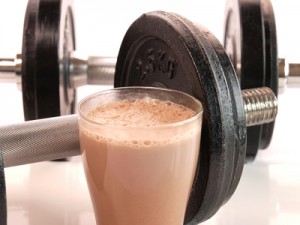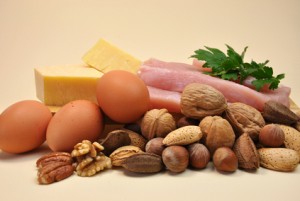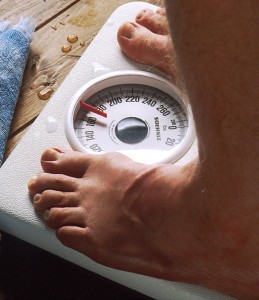Could Collagen Supplements Make You Leaner?
Author: Dr. Stephen Chaney
 Collagen supplements have been considered “vanity products”. Their largest market is people who want to have younger, more beautiful skin. And for many people, collagen delivers on this promise.
Collagen supplements have been considered “vanity products”. Their largest market is people who want to have younger, more beautiful skin. And for many people, collagen delivers on this promise.
However, collagen plays many other roles in the body. It also helps rebuild tendons and ligaments. Many people take collagen supplements to reduce joint pain.
But could collagen supplements coupled with resistance training also build muscle and reduce fat? If so, that would be huge.
A recent study (D Zdzieblik et at, British Journal of Nutrition, 114: 1237-1245, 2015) suggested collagen supplements may do just that. This study showed that a collagen supplement plus resistance training increased lean muscle mass and decreased fat mass in elderly men (average age = 72).
If this finding is duplicated in future studies, it has significant health implications. Both men and women in their 70s lose muscle mass at a rapid rate (a process called sarcopenia). Anything that slows or reverses this process has the potential to extend high quality life and prolong their golden years.
But what about younger adults? Could a collagen supplement plus resistance training also help them build muscle and lose fat? This study (D Zdzieblik et at, International Journal of Environmental Research and Public Health, 18: 4837-4855, 2021) was designed to answer that question.
It was a randomized, placebo-controlled study comparing 15 g of collagen peptides with 15 g of whey protein, and a placebo (silicon dioxide).
How Was This Study Done?
 The study recruited 120 middle-aged (average age = 50), overweight (average BMI = 30) men who were untrained (<60 minutes of exercise per week over the previous year). [In other words, the study recruited middle-aged couch-potatoes.]
The study recruited 120 middle-aged (average age = 50), overweight (average BMI = 30) men who were untrained (<60 minutes of exercise per week over the previous year). [In other words, the study recruited middle-aged couch-potatoes.]
The participants were asked to fill out a three-day diet analysis at the beginning and end of the 12-week study with the assistance of a nutritionist.
- Average caloric intake was 2,600 calories/day.
- Average protein intake was 104 grams/day. That is 30% higher than the recommended protein intake for men of that age and weight.
- The macronutrient content of the diet was 16% protein, 37% fat, and 43% carbohydrate.
- These values were not significantly different between groups and did not change during the study.
All participants participated in a one-hour training program three times per week. The training began with a 10-minute cardio exercise to warm up. That was followed by a three-set program consisting of horizontal leg presses (both legs), reverse crunches, lat-pull exercise, sit-ups, and chest presses with 1 to 2 min rest periods between sets. The intensity of exercise was gradually increased over the 12-week study.
The participants were randomly divided into three groups. After each workout they were given sachets containing 15 g of collagen peptides, 15 g of whey isolate, or 15 g of silicon dioxide (placebo). They were instructed to dissolve the powder in 8 ounces of water and drink it within one hour of the workout. They were also given the same sachets and instructed to take them at the same time of day for the days they were not working out.
Finally, the participants were instructed not to change their diet or physical activity apart from the intake of the powder in the sachets they were given and the one-hour training sessions.
Do Collagen Supplements Build Muscle?
 All three groups had statistically significant:
All three groups had statistically significant:
- Increases in percent lean muscle mass.
- Decreases in percent fat mass.
- Increases in leg muscle strength.
No surprises here. If you take a group of middle-aged couch-potatoes and put them in a strength training program, you will see increases in lean muscle mass, decreases in fat mass, and increases in muscle strength.
The real question was what was the effect of the collagen and whey protein supplements? This is where the results got really interesting.
- The collagen peptide supplement gave a significantly greater increase in lean muscle mass and decrease in fat mass than the placebo. The increase in leg muscle strength was also greater than the placebo, but this difference was not statistically significant.
- The whey protein supplement also increased lean muscle mass and decreased fat mass compared to the placebo, but these differences were not statistically different.
In other words, at the doses used in this study (see next section for discussion), the collagen supplement worked better than the whey protein supplement. Here is the actual data from the study:
- Increase in percent lean muscle mass: collagen supplement = 7.4%, whey protein supplement = 5.8%. placebo = 5.0%.
- Decrease in percent fat mass: collagen supplement = 15%, whey protein supplement = 11.5%, placebo = 10%.
In the words of the authors, “In conclusion, collagen peptide supplementation combined with resistance training was associated with a significantly greater increase in fat free mass and a decrease in fat mass compared with placebo. Resistance training combined with whey protein also had a positive impact on body composition, but the respective effects were more pronounced following the collagen peptide administration.”
Could Collagen Supplements Make You Leaner?
 This study leaves lots of questions. Let me handle the main ones here.
This study leaves lots of questions. Let me handle the main ones here.
What Are The Strengths and Weaknesses Of The Study?
The strengths are obvious. This was a well-design, randomized, placebo-controlled clinical trial, which is the gold standard for determining the efficacy of a treatment.
The weaknesses are also obvious. This was a very small clinical study. There is one previous study that showed the same benefit of collagen in an older age group. However, both studies were published by the same group of scientists. And these scientists were funded by the manufacturer of the collagen product used in the study. More and larger studies performed by other laboratories are needed to confirm this finding.
How Do Resistance Exercise, Whey Protein, And Collagen Stimulate Muscle Growth?
Muscle growth is stimulated by a regulatory pathway called mTOR that (among other things) regulates protein  synthesis in muscle cells. For the purposes of this article, I will discuss 3 mechanisms for activating mTOR and increasing muscle protein synthesis.
synthesis in muscle cells. For the purposes of this article, I will discuss 3 mechanisms for activating mTOR and increasing muscle protein synthesis.
#1: Resistance exercise (weight training) activates mTOR. That should come as no surprise. The main reason people do weight training is to increase strength and muscle mass. mTOR is the pathway that makes this possible.
#2: Whey protein is rich in the essential amino acid leucine, and leucine also stimulates the mTOR pathway.
- Leucine is one of three branched chain amino acids. While all three branched chain amino acids have been traditionally credited with stimulating muscle protein synthesis, recent research has shown that only leucine is needed. The other two branched chain amino acids just play a supportive role. You only need enough of the them to make a complete protein.
- While whey protein gets all the attention in the sports world, any complete protein with high levels of leucine has the same effect.
- The effect of leucine and resistance training on the mTOR pathway are additive. That is why whey and other leucine-rich proteins enhance the effect of resistance exercise on both muscle mass and strength.
#3: Collagen does not contain enough leucine to activate the mTOR pathway. However, the authors have proposed another mechanism to account for collagen activation of the mTOR pathway.
- Most proteins we eat are digested to their individual amino acids before they are absorbed. However, collagen is rich in an unusual amino acid called hydroxyproline that makes collagen resistant to our digestive enzymes.
- Thus, collagen is not digested to individual amino acids, but to small peptides that are absorbed from our intestine.
- One of these breakdown products, a dipeptide composed of glycine and hydroxyproline, has been shown to stimulate the mTOR pathway.
While this mechanism has not been proven, collagen does appear to enhance the effect of resistance exercise on both muscle mass and strength.
Collagen Only Has 8 Essential Amino Acids. How Could It Stimulate The Synthesis Of Muscle Protein, Which Requires 9 Essential Amino Acids?
 The answer is simple. The people in this study were consuming 30% more than the recommended amount of protein in their diet in addition to the collagen supplement. They already had all the essential amino acids needed to synthesize muscle protein. The collagen supplement simply stimulated the rate of muscle protein synthesis by activating the mTOR pathway.
The answer is simple. The people in this study were consuming 30% more than the recommended amount of protein in their diet in addition to the collagen supplement. They already had all the essential amino acids needed to synthesize muscle protein. The collagen supplement simply stimulated the rate of muscle protein synthesis by activating the mTOR pathway.
However, there are situations in which the 9th essential amino acid could become important for muscle protein synthesis. Here are two examples
- Vegans and strict vegetarians might not be getting enough protein in their diet. As I pointed out in a previous article vegan “experts” know how to get enough protein from their diet, but many vegan “novices” do not.
- Older Americans are also at risk. They need extra protein in their diet to prevent sarcopenia (muscle loss) as they age. And some of them are on restrictive diets, either because of the latest fad or because of loss of income and/or mobility.
Why Did The Collagen Supplement Work Better Than Whey Protein In This Experiment?
Again, the answer is simple. Both collagen and leucine-rich proteins like whey enhance muscle protein synthesis by activating the mTOR pathway (see above). This study used the same amount of protein (15 g/day) for both collagen supplement and the whey protein supplement.
While 15 g/day appears to be optimal for the collagen supplement, the authors pointed out that previous studies suggest that the optimal dose for whey protein is closer to 20 g/day for middle-aged men.
So, I would ignore the apparent difference in effectiveness of the collagen and whey protein supplements.
The important conclusion is that both collagen and leucine-rich proteins like whey enhance the effect of resistance exercise on lean muscle mass to a similar extent. But they appear to do so by slightly different mechanisms.
What Does This Mean For You?
This study is intriguing. It suggests that collagen may have some tricks up its sleeve we didn’t know about.
- It may do more than give you a healthy, youthful looking skin.
- It may do more than help with achy joints.
- Coupled with resistance exercise it may also help you increase muscle mass and reduce fat mass. It may make you leaner.
The Bottom Line
Collagen supplements have been considered “vanity products”. Their largest market is people who want to have younger, more beautiful skin. And for many people, collagen delivers on this promise.
However, collagen plays many other roles in the body. It also helps rebuild tendons and ligaments. Many people take collagen supplements to reduce joint pain.
But collagen may have other tricks up its sleeve. A recent study suggests that collagen supplements may enhance the effect of resistance exercise on increased muscle mass and reduced fat mass. It may make you leaner.
The study also concluded that both collagen and whey protein enhance the effect of resistance exercise on lean muscle mass to a similar extent. But they appear to do so by slightly different mechanisms.
Let me be clear. I am not recommending you take a collagen supplement to help you build muscle mass. I consider these results as preliminary, and we have good evidence that leucine-rich proteins plus resistance exercise helps build muscle mass.
However, if you are taking a collagen supplement for another reason and are working out, this could be an unexpected benefit.
For more details about this study and how collagen supplements may increase muscle mass, read the article above.
These statements have not been evaluated by the Food and Drug Administration. This information is not intended to diagnose, treat, cure, or prevent any disease.


